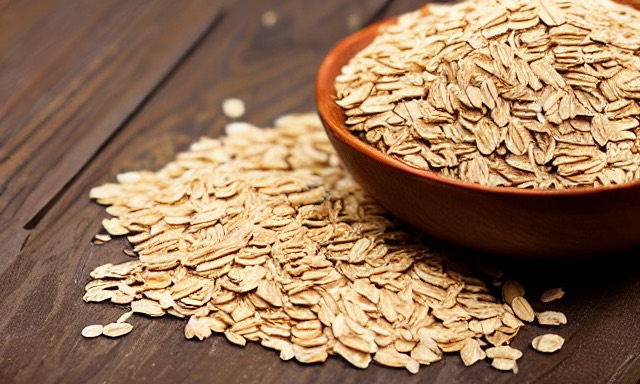Internet Asks: “Does Oatmeal Cause Gas?”
Gas is a natural bodily function that can sometimes make us feel a little uneasy, especially when it happens at inconvenient times. While certain foods are known to cause gas, the question arises: does oatmeal, that wholesome breakfast staple, contribute to this gassy predicament? Let's dig into the world of oatmeal and its potential effects on our digestive system.
sponsored links

What Causes Gas?
First, let's understand why some foods can cause gas. Gas is a normal byproduct of the digestive process. Gas in our digestive system occurs when bacteria in the large intestine break down undigested carbohydrates, producing gases like carbon dioxide, hydrogen, and methane. Certain carbohydrates, known as FODMAPs (fermentable oligosaccharides, disaccharides, monosaccharides, and polyols), are more likely to cause gas production.
The Oatmeal Gas Theory
Now, let's explore the gas potential of oatmeal. Oatmeal itself is a low-FODMAP food, meaning it contains minimal amounts of those gas-producing carbohydrates. This is good news for those who are prone to experiencing gas-related discomfort. However, it's important to note that everyone's digestive system is unique, and individuals may have different sensitivities to certain foods.
In some cases, gas may be related to how oatmeal is prepared and consumed. Adding high-FODMAP ingredients like honey, dried fruits, or excessive amounts of sweeteners can potentially contribute to gas production. Additionally, eating oatmeal too quickly, not chewing thoroughly, or consuming large portions can lead to swallowing excess air, which can result in bloating and gas.
Tips for Reducing Gas
To minimize the likelihood of experiencing gas after consuming oatmeal, consider the following tips:
- Portion Control: Stick to a moderate serving size that suits your individual needs. Start with a smaller portion and see how your body reacts.
- Slow and Steady: Take your time while eating oatmeal, allowing for proper chewing and digestion. Eating slowly can reduce the amount of air you swallow and aid in the overall digestion process.
- Toppings and Additions: Choose low-FODMAP toppings and additions, such as a sprinkle of cinnamon, a handful of low-FODMAP fruits like blueberries or strawberries, or a small portion of nuts or seeds.
- Soak Overnight: Preparing your oatmeal by soaking it overnight can make it easier to digest and may reduce the likelihood of gas-related discomfort.
- Monitor Your Body's Response: Pay attention to how your body reacts to oatmeal and adjust your consumption accordingly. If you consistently experience discomfort, consider consulting a healthcare professional or a registered dietitian for personalized advice.
sponsored links
The Benefits of Oatmeal
Despite the gas-related concerns, oatmeal offers numerous health benefits that make it a breakfast staple for many:
- Heart-Healthy: Oats are packed with soluble fiber, which has been shown to help lower cholesterol levels and promote heart health.
- Blood Sugar Management: The complex carbohydrates in oatmeal are digested slowly, leading to a gradual release of glucose into the bloodstream and better blood sugar control.
- Nutrient Powerhouse: Oatmeal is rich in essential nutrients like vitamins, minerals, and antioxidants, providing a wholesome start to your day.
- Satiety and Weight Management: Oatmeal's high fiber content helps you feel fuller for longer, potentially aiding in weight management and preventing overeating.
Conclusion
While oatmeal may cause gas in some individuals due to its fiber content and slow digestion, it is not a universal reaction. Remember that everyone's digestive system is unique, and individual tolerances vary. If you enjoy oatmeal but experience discomfort, try implementing the tips mentioned above to minimize the likelihood of gas. Rest assured that the benefits of oatmeal, including its heart-healthy properties, blood sugar management, and nutrient richness, outweigh the potential gas-related concerns. So, go ahead and savor a warm bowl of oatmeal, knowing that you're nourishing your body with a nutritious breakfast option.
sponsored links
References
- John Hopkins Medicine. Gas in the digestive tract. https://www.hopkinsmedicine.org/health/conditions-and-diseases/gas-in-the-digestive-tract
- Bonheur MD. Gas and Bloating. https://www.bonheurmd.com/gas-and-bloating/
- WebMD. Oats. https://www.webmd.com/vitamins/ai/ingredientmono-814/oats
- Men’s Health. 15 Foods That Make You Fart All the Time. https://www.menshealth.com/health/a19546650/foods-that-make-you-fart/
People are also reading...
Does Sprite Have Caffeine?
Calories In Steak?
Chicken Taco Calories?
Does Hot Chocolate Have Caffeine?
Are Carrots Acidic?
Are Mangoes Acidic?
Orange Juice pH?
Does Kahlua Have Caffeine?
Calories In a Grilled Cheese?
Is Watermelon Acidic?
6 oz Steak Calories?
Are Strawberries Acidic?
Ready to level-up?
Create meal plans 10x faster, follow up with your clients through our mobile app, and never struggle with meal planning or recipe management again.